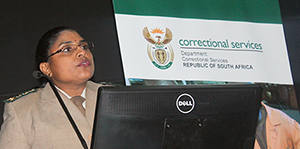Latest News Archive
Please select Category, Year, and then Month to display items
12 January 2024
|
Story Nonsindiswe Qwabe
|
Photo Sonia Small
 Since joining the UFS in 2008, Dr Grey Magaiza has worked extensively on approaches that can foster the socio-economic transformation of societies.
Since joining the UFS in 2008, Dr Grey Magaiza has worked extensively on approaches that can foster the socio-economic transformation of societies.
“The future should be one where communities can decide on their development agenda and futures. That’s the most important for me.” Dr Grey Magaiza, Deputy Director of the Centre for Gender and Africa Studies (CGAS) and Head of the Community Development programme on the Qwaqwa Campus, is passionate about capacitating communities to be agents of change and advancement. His vision for the future emphasises the empowerment of communities to take charge of their development by actively participating in decision making and the implementation of development projects that can improve their lives.
Since joining the UFS in 2008, Dr Magaiza has worked extensively on approaches that can foster the socio-economic transformation of societies. Over the years, he has crafted his research speciality into one that he is most proud of – being an interdisciplinary scientist immersed in the development of communities.
“I’m in a fortunate position of researching what I like. I say ‘fortunate’, because I’ve taken the time to understand what I’m passionate about, which is the overall field of rural livelihoods and livelihood futures – in short, community development. My research starts from an engaged university, understanding the elements that a university must use to enhance transformation and relevance to its immediate community in terms of development.”
One of the ways he has done this is by looking at social entrepreneurship as a development approach for young people in a rural setting. Through workshops with non-profit and civic organisations in Qwaqwa, Dr Magaiza has been helping these organisations to map out their needs and actively meet them through the involvement and support of external role players.
“We understand that communities are part of the national development agenda, but even that national agenda respects community knowledge and intentions and allows communities to shape their identity. A critical enabler of this is community organising. You bring back the capacity in communities to have dialogues on issues affecting them as spaces for engagement, knowledge exchange, and for people to just talk about their way forward.”
By enabling communities to define their development agenda, they can address their specific needs, challenges, and aspirations, he said. “When I look at livelihood futures, it’s quite an exciting aspect of my work – it’s like looking into a fortune tellers’ globe, because you’re not deciding for communities what they should do, but the communities themselves take those decisions.”
Offender learners get unique opportunity
2016-08-02
 Subashini Moodley, Regional Commissioner Northern Cape
Subashini Moodley, Regional Commissioner Northern Cape
and Free State.
Photo: Rulanzen Martin
Nelson Mandela spoke of education as the tool of liberation. Kamogelo Dithebe, Chairperson of the Postgraduate Student Council (PGSC), opened the PGSC’s Mandela Day Project with these striking words.
The PGSC at the University of the Free State (UFS) hosted the Tswelopele Correctional Service Centre Career Day for their annual Mandela Day project on the Bloemfontein Campus on 27 July 2016. Grade 11 and 12 learner offenders from the Kimberley-based centre were given a tour of the campus.
Visitors empowered with knowledge
Subashini Moodley, Free State and Northern Cape Regional Commissioner, said: “It is really a privilege to be here today. It is not every day you see a Correctional Centre roaming around campus.” She thanked the postgraduate council for making the opportunity possible, as it was the first open day for the offender-learners in collaboration with the PGSC.
She told the offender-learners that they were privileged to be given the opportunity as many learners in a normal school environment often come to university not knowing what to expect or what to study. She said they should empower themselves with knowledge as they met with the different faculties.
Tour encourages and change lives
Mthulisi Zandile, a Grade 12 offender learner, was very excited to learn about the career options available after completing a university degree. “It means a lot to us as it will further our education, and bring change in our life, as this will show me the right route to pass matric with flying colours,” said Mthulisi.